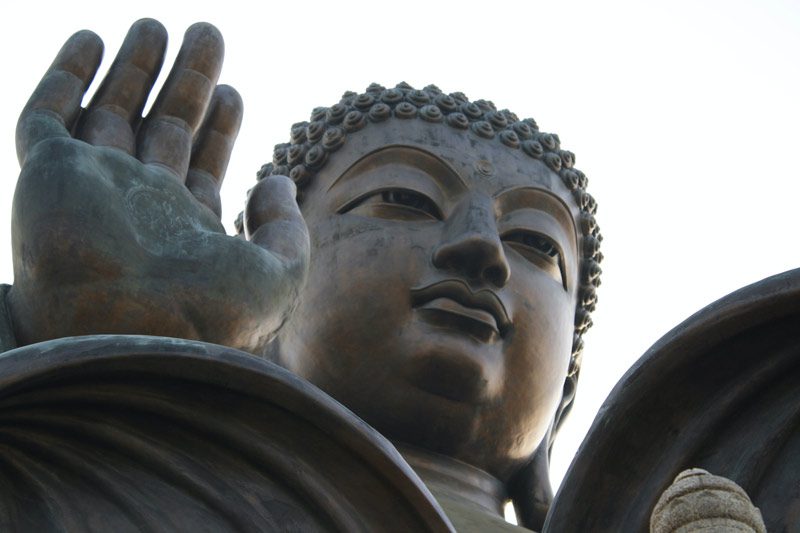“Life is suffering.” This phrase is associated with Buddhism and its Noble Truths. If you have struggled with your mental health, you know well how painful it can be to simply reside in your brain. In the context of the Noble Truths, the term “suffering” is an English translation of the Sanskrit word “duhkha” (or “dukkha” in Pali). Alternatively, the quality of duhkha is sometimes translated as pain, unhappiness, unsatisfactoriness, sorrow, or stress. According to Buddhist belief, humans suffer due to our attachments, aversions, and ignorance. In fact, dukkha can also refer to any impermanent or conditioned state, even including joy. The desire for and clinging to positive emotions also leads to suffering.
Overall, the goal of spiritual enlightenment (nirvana) in Buddhism is to cease the continuous karmic cycles of existence. In some respects, it could be considered an antinatalist religion. (As an aside, it’s important to note that antinatalists prescribe a negative value to procreation but not to continuing to live once one is born!) Even the most privileged lives contain pain. Siddhartha Gautama, a prince with every luxury in the world, chose to renounce his earthly pleasures and embark on a journey to attain enlightenment. In so doing, he became the Buddha.
Regardless of who you are, you are guaranteed to experience pain. Humans suffer in a multitude of complex ways. As with other creatures, we endure physical pains and ailments—such as illnesses, injuries, and limitations caused by the aging process. But humans also suffer psychologically, emotionally, and intellectually to a degree that other living beings do not. If you have ever lived with a mental health condition, you know how hard it can be.
While most animals seem to live fully and contentedly in the present moment, the human mind in its normal state is prone to worrying about the future, agonizing about the past, recalling painful events and injustices, imagining awful scenarios, fretting over morals and ethics (worrying about being “a good person,” according to the current ethical landscape of one’s community), and so on. This is especially so if you have a mental illness like anxiety.
Human brains are incredible. They have allowed us to dominate the planet, as we are innovative, intelligent, and adaptable to a wide range of situations and environments. But our highly developed minds also create needless suffering in our daily lives. We worry and ruminate about so many things: health, safety, livelihoods, fulfilling our potential, belonging, identity, other people (and what they say and do, and what they think about us), morality, our past and future, aging, death, etc. The list goes on.
Although this post may seem overly negative so far, you could also perceive it as simply being realistic and honest—especially if you have a long history of mental health struggles. And though Buddhism may be interpreted as a pessimistic worldview, its teachings offer us ways to cope.
Mindfulness for Inner Peace
A wonderful development to come out of Buddhist belief is the widely known and practiced concept of mindfulness. Nowadays, there is an abundance of books, websites, videos, courses, and other resources on mindfulness. For those who aren’t that familiar with it, to be mindful means to focus your attention intentionally on your present experience without judgment. You might choose to focus on your breathing or body parts. Or you might pay full attention to what you can see, hear, touch, smell, or taste in your immediate surroundings.
Naturally, the mind will drift—to memories, judgments, criticisms, to-do lists, other distractions, and so on. Perhaps the best thing about mindfulness is that there is no way to “fail” at it. Whenever you notice your “monkey mind” wandering away, gently bring your focus back. Do it as many times as necessary and have self-compassion. The past is gone; the future is not yet here (and never will be). The only time we can experience peace is in the present moment.
Mindfulness practice has been theoretically and empirically demonstrated to improve emotional well-being and decrease pain. Although mindful meditation grew out of traditional religious practices, including those of Hinduism and Buddhism, its contemporary application “to psychological health in Western medical and mental health contexts is a more recent phenomenon, largely beginning in the 1970s.” According to a 2011 article in the Clinical Psychology Review, “Effects of Mindfulness on Psychological Health: A Review of Empirical Studies,” most research adopts a mindfulness model that incorporates two aspects:
- Self-regulation of attention. This involves the simple awareness and observation of the emotions, thoughts, and sensations you are presently experiencing. It is about purposefully focusing your attention.
- Orientation to experience. This aspect refers to the quality of the perspective or attitude you have about your present experience. It involves cultivating an attitudinal orientation of acceptance, openness, and curiosity. This orientation refers to the attachment-free view you hold about what you are observing.
Together, these two components form mindfulness: intentionally focusing your attention on your present experience with acceptance and without judgment. The mind is spacious, like the sky. Experiences are temporary, like passing clouds.
Mindful meditation was popularized in the Western world thanks to practitioners such as Jon Kabat-Zinn and Thich Nhat Hanh. After being introduced to meditation by a Zen missionary, Jon Kabat-Zinn furthered his practice under Thich Nhat Hanh and other meditation teachers. He then established the Stress Reduction Clinic and the Mindfulness-Based Stress Reduction program at the University of Massachusetts Medical School in 1979. The initial program was designed for treatment-resistant patients with chronic pain and mental illnesses. After the course, patients reported less pain and greater well-being.
Mindfulness-Based Stress Reduction for Mental Health
Mindfulness-Based Stress Reduction (MBSR) is a secular, evidence-based program that lasts for eight weeks. Participants apply and develop the core components of mindfulness: judgment-free attention awareness. Certified instructors teach the course, and students engage in mindfulness practice in class and at home. The course includes breathwork, meditation, yoga, discussions of experiences, gratitude journaling, and home practice. Over time, practitioners gradually integrate a mindful awareness and attitude into more of their daily activities, beyond the “formal” meditation sessions. It can be refreshing to approach life with a beginner’s mind and newfound curiosity.
MBSR training has been demonstrated to support “primary, secondary, and tertiary public health goals: preventing illness and disease—including cultivating inner resources that support resilience and health coping.” As stress reduction is beneficial for “any disease-state,” it helps us cope with mental and physical health conditions and general life stress. And if you’re unable to attend an in-person program, there are online options for learning.
Everyone encounters pain—whether you’re thinking about a Buddhist living a thousand years ago or millennials reading this blog post on their smartphones. And we now know that certain psychological conditions, such as borderline personality disorder, are correlated with increased intensity and duration of negative moods. Whichever thoughts, emotions, or reactions occur for you, try to step back and mindfully observe them without judgment. Remember that you are more than your fleeting thoughts, feelings, and sensations. Have you ever had one that lasted forever?
If you or someone you know experiences mental health issues, it is important to seek help from a qualified professional. Our Resource Specialist can help you find expert mental health resources to recover in your community. Contact us now for more information on this free service to our users.
About the Author: Monique Moate is a professional writer and editor living in Sydney, Australia. She holds a postgraduate degree in editing and digital publishing and has lived experience of mental health struggles.
rtor.org and Our Sponsor Laurel House, Inc. Celebrate Pride in June
On June 28, 1969, New York City police raided the Stonewall Inn, a gay nightclub in Greenwich Village, sparking a riot and six days of protests. This incident, known as the Stonewall Uprising, marks a turning point in the gay rights movement, now celebrated as Pride Month in June.
This Pride Month, www.rtor.org and Laurel House affirm their commitment to supporting members of the LGBTQ+ community in their quest for equity and justice, especially in their fight for accessible, safe health and mental health care.
www.rtor.org and Laurel House are committed to the advancement of racial equity and social justice, and to making mental health services available to all.
Photo by Callum Parker on Unsplash
The opinions and views expressed in any guest blog post do not necessarily reflect those of www.rtor.org or its sponsor, Laurel House, Inc. The author and www.rtor.org have no affiliations with any products or services mentioned in the article or linked to therein. Guest Authors may have affiliations to products mentioned or linked to in their author bios.





